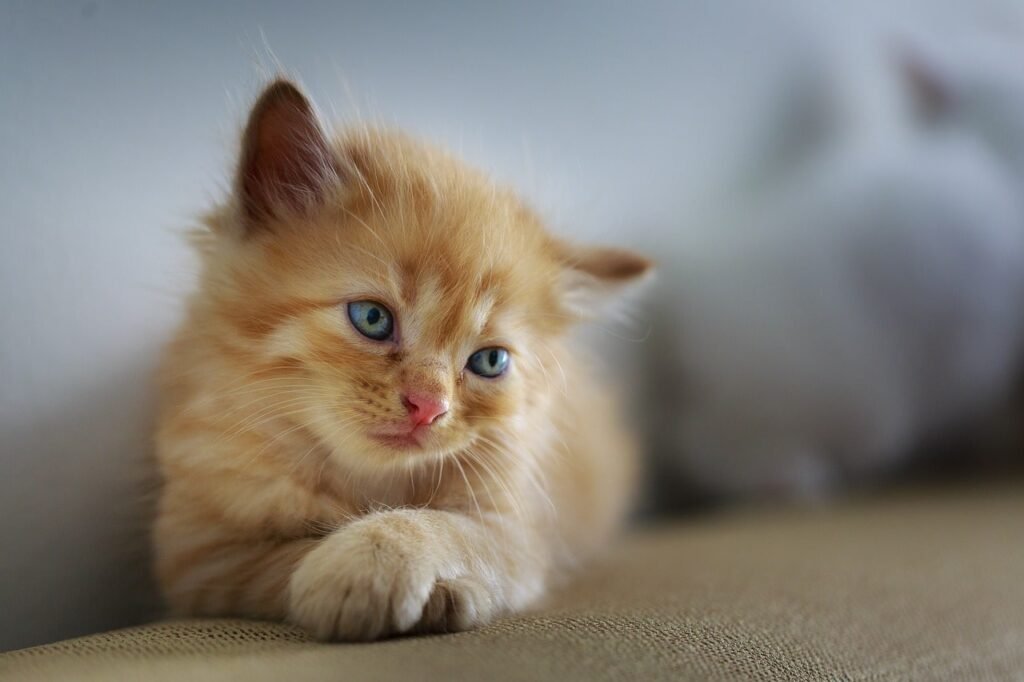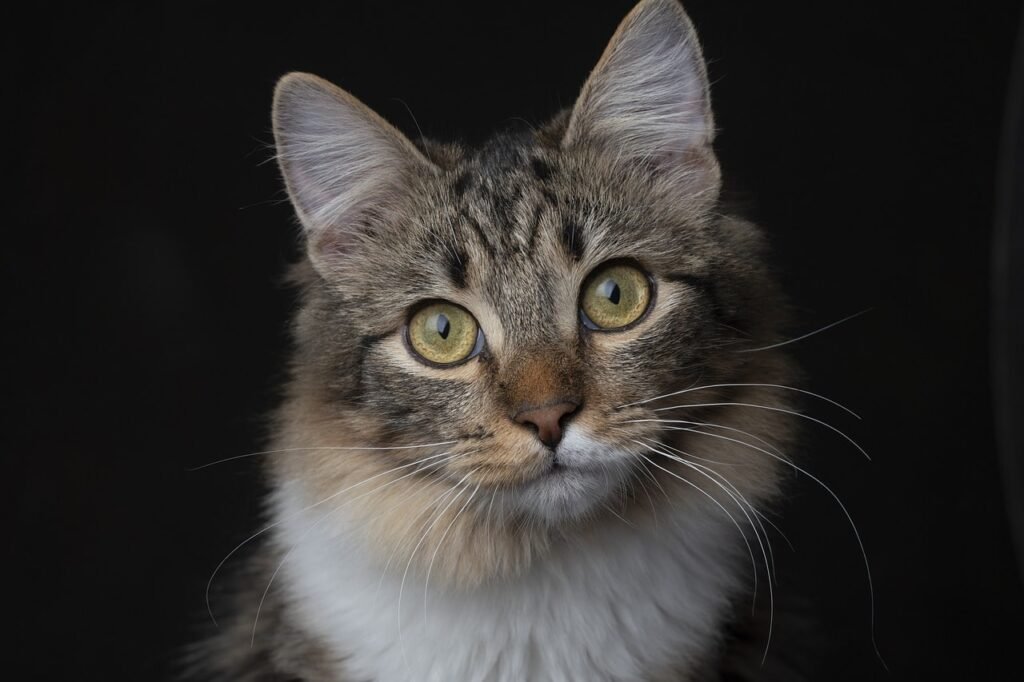
Understanding Cat Anxiety: Causes, Symptoms, and Solutions
We all know that cats can be a little… unpredictable. One minute they’re purring in your lap, and the next, they’re staring at the wall as if they’ve seen the ghost of a long-forgotten tuna. But what if your cat is constantly on edge? Just like people, cats can suffer from anxiety, and it’s something every cat parent should be aware of.
In this article, we’ll break down what causes cat anxiety, how to spot the signs, and what you can do to help your feline friend relax and feel safe again.
What Causes Cat Anxiety?
Cats, like humans, can experience stress and anxiety for many reasons. Some of the most common causes include:
- Changes in Environment
Whether you’ve moved to a new home, rearranged the furniture, or welcomed a new family member (human or animal), sudden changes in a cat’s environment can trigger anxiety. Cats are creatures of habit, and when their territory feels unfamiliar, they may become anxious. - Separation Anxiety
If your cat becomes unusually clingy when you leave the house, they may be dealing with separation anxiety. They might follow you around, cry at the door, or even destroy things in your absence. It’s their way of expressing that they don’t want to be left alone! - Loud Noises
Thunderstorms, fireworks, or even the vacuum cleaner can send a cat into a panic. Cats have sensitive hearing, and sudden loud noises can be overwhelming and scary. - Health Issues
Sometimes, anxiety can be a symptom of an underlying health problem. If your cat’s behaviour suddenly changes—like they’re hiding more than usual or acting unusually aggressive—it might be worth checking in with your vet to rule out any medical causes. - Past Trauma
If your cat has had a rough start in life (like being a stray or abused), they may have developed anxiety. Traumatic experiences can leave lasting emotional scars on cats, making them more fearful or skittish in certain situations.
How to Spot the Signs of Cat Anxiety
Not sure if your cat is anxious? Here are some common signs to look out for:
- Excessive Hiding
Cats who are anxious often retreat to hiding spots, avoiding social interaction and staying in quiet, secluded places. - Aggression or Irritability
If your normally calm cat is suddenly swatting, hissing, or growling at everyone (including you!), it could be a sign that something is stressing them out. - Over-Grooming
Anxiety can cause a cat to groom excessively. This might lead to bald patches or irritated skin. It’s their way of trying to self-soothe, but it can make things worse in the long run. - Loss of Appetite
An anxious cat may refuse to eat or drink. If you notice that your cat’s eating habits have changed, it might be a sign of stress or discomfort. - Excessive Vocalization
Some cats express anxiety by meowing, yowling, or crying loudly. If your cat suddenly starts talking more than usual, they may be feeling a little more anxious than normal.

How to Help Your Anxious Cat
Now that you know what’s causing your cat’s anxiety, let’s talk about how to help them relax. Here are some tips:
- Create a Calm Environment
If possible, try to keep your cat’s environment quiet and calm. Set up a cozy space with their favorite blanket or bed, away from loud noises and bustling activity. A quiet, safe retreat can work wonders for an anxious cat. - Establish a Routine
Cats love routine. Try to keep their feeding, playtime, and cuddle sessions on a consistent schedule. This predictability can make them feel more secure. - Provide Interactive Playtime
Play is a great stress reliever for cats! Use toys that engage their natural hunting instincts, like laser pointers or feather wands. Playing with your cat regularly can help burn off anxious energy and boost their mood. - Use Calming Products
There are various calming products available for cats, such as pheromone diffusers, calming collars, or anxiety-reducing treats. These products can help ease your cat’s anxiety without the need for medication. - Consider a Vet Visit
If your cat’s anxiety seems severe or is causing other health problems, it’s a good idea to consult your vet. In some cases, they may recommend medication or other treatments to help manage your cat’s anxiety. - Give Them Space (But Don’t Ignore Them)
If your cat seeks solitude, respect their need for space. But don’t completely ignore them—be nearby so they know they can approach you when they’re ready. It’s a delicate balance of giving them independence while offering emotional support.
The Bottom Line: Anxiety Is a Common Feline Struggle
If you’ve noticed your cat acting a little more nervous or skittish than usual, it’s not a sign that they don’t love you. Like people, cats have their own set of fears and anxieties. But with a little patience, understanding, and TLC, you can help your cat manage their anxiety and feel safe and secure in their home again.
So next time your cat gives you that “I’m not sure about this” look, give them a little extra love and try some of these calming techniques. And remember, every cat is different, so don’t be discouraged if it takes time for your furry friend to feel completely relaxed again!
More Tips for Managing Cat Anxiety
While we’ve covered the main strategies for calming an anxious cat, there are a few more things you can do to ensure your furry friend feels safe, comfortable, and loved.
1. Consider Enrichment Activities
While we’ve covered the main strategies for calming an anxious cat, there are a few more things you can do to ensuraBoredom can contribute to anxiety, so be sure to provide plenty of entertainment. Puzzle feeders, cat trees, and interactive toys like laser pointers and feather wands can stimulate their minds and keep them engaged. The more they stay busy, the less they’ll have time to worry about the things that stress them out!e your furry friend feels safe, comfortable, and loved.
2. Try Catnip or Calming Treats
Catnip can act as a temporary stress reliever for many cats, providing a calming or euphoric effect. Similarly, there are a variety of calming treats that contain natural ingredients like valerian root or chamomile. You could see your cat go from “grumpy cat” to “content cat” with just a few treats!
3. Gradual Desensitization
If your cat’s anxiety is triggered by specific events, like trips to the vet or loud noises, you can try desensitization techniques. For example, if your cat is scared of the car ride to the vet, start by placing them in the carrier for short periods around the house. Gradually increase the length of time they spend in the carrier until they become less stressed by it. Baby steps can work wonders.
4. Use a Calming Routine for Bedtime
Cats are creatures of habit, and they thrive on routine. Creating a calm evening routine can help reduce nighttime anxiety. Consider playing soothing music, using a pheromone diffuser, or even offering a small snack before bed to let your cat know it’s time to wind down.
5. Don’t Punish the Anxiety
It’s important to understand that your cat’s anxious behavior is not something they can control, so avoid punishing them for it. Scolding or reprimanding an anxious cat can make their anxiety worse. Instead, offer patience and understanding as they work through their feelings.
When to Seek Professional Help
If you’ve tried multiple strategies and your cat’s anxiety is still affecting their quality of life, it might be time to talk to a professional. A veterinary behaviorist can assess the situation and provide tailored advice and treatment options, including possible medication to manage severe anxiety. Your vet can also help rule out any underlying health problems that might be contributing to their stress.
In Conclusion: You’re Not Alone in the Cat Anxiety Struggle
Dealing with a stressed-out cat is no walk in the park, but rest assured you’re not alone! Many cat owners face similar challenges, and with a bit of effort, patience, and the right techniques, you can help your cat feel more relaxed and at ease. Cats may not always be as expressive as dogs, but they definitely appreciate the extra care you give them.
So, the next time your cat is having a little “feline meltdown,” try these tips and know that, with time and attention, your kitty will soon be back to their calm, cool, and collected self. Remember, a relaxed cat is a happy cat—and a happy cat makes for a happy home!

Cat Anxiety frequently asked questions (FAQs):
Here are some frequently asked questions (FAQs) about cat anxiety to help you better understand and manage your cat’s stress:
1. What are the most common causes of cat anxiety?
Answer: Cats can experience anxiety due to several factors:
- Changes in their environment (moving to a new home, rearranging furniture, or new people/pets in the house).
- Separation anxiety, especially if they’re very attached to you.
- Loud noises like fireworks, thunderstorms, or even the vacuum.
- Health issues or pain.
- Trauma or abuse in their past.
2. How can I tell if my cat has anxiety?
Answer: Look for the following signs:
- Excessive hiding or avoiding interaction.
- Aggression (swatting, biting, hissing).
- Over-grooming or hair loss.
- Loss of appetite or vomiting.
- Excessive meowing or vocalizing.
- Destructive behavior like scratching or chewing things they shouldn’t.
3. What should I do if my cat is anxious when I leave the house?
Answer: If your cat suffers from separation anxiety, try these tips:
- Leave them with a comfy bed, toys, or a blanket with your scent.
- Gradually increase the time you’re away to help them get used to it.
- Use calming products like pheromone diffusers or calming collars.
- Leave some background noise (like a TV or radio) to make them feel less alone.
4. Can anxiety in cats be treated?
Answer: Yes, anxiety in cats can be managed! Treatment options include:
- Creating a calm environment with places for them to retreat.
- Interactive play to reduce stress and anxiety.
- Calming products like pheromone diffusers, sprays, and anxiety-reducing treats.
- Behavioral therapy or desensitization techniques to help them adjust to stress triggers.
- In severe cases, your vet may recommend medication.
5. Are there any natural remedies for cat anxiety?
Answer: Yes, some natural remedies can help calm an anxious cat:
- Catnip can have a calming effect on some cats.
- Valerian root and chamomile-infused treats may help relax your cat.
- Lavender essential oils (used safely) can have a calming effect, but be sure not to put them directly on your cat.
6. Should I consult a vet if my cat’s anxiety doesn’t improve?
Answer: Yes. If your cat’s anxiety is severe or if their behavior is causing health issues (like loss of appetite or excessive grooming), a visit to the vet is essential. They may refer you to a veterinary behaviorist for further evaluation or recommend medication to help manage anxiety.
7. Can a change in routine cause anxiety in cats?
Answer: Absolutely. Cats are creatures of habit, and any disruption to their daily routine (like feeding times or changes in household activity) can cause stress. Try to keep their routine as consistent as possible, especially during times of change.
8. Why does my cat get anxious when I bring out the carrier?
Answer: Cats often associate their carrier with trips to the vet, which can cause anxiety. You can help by making the carrier a more positive space. Place treats or toys inside, and leave it out in a comfortable area where they can explore it freely. Over time, your cat may start to associate the carrier with a more positive experience.
9. Is it normal for cats to get anxious during storms or fireworks?
Answer: Yes, many cats experience anxiety during storms or fireworks because of the loud noises. You can help by creating a safe, quiet space for them to hide, using calming pheromone sprays, or providing distractions like soft music or a cosy hideout.
10. How long does it take for a cat to adjust to a new environment?
Answer: Cats can take anywhere from a few days to several weeks to fully adjust to a new environment, depending on their temperament and past experiences. Be patient and offer plenty of positive reinforcement and comfort to help them feel safe.
Bottom Line: Anxiety is a common issue for cats, but with the right strategies, most cats can feel more relaxed and comfortable at home. If your cat’s anxiety is severe or persistent, consulting with a vet or a behaviorist can help you find the best solution to keep your furry friend feeling happy and secure.


